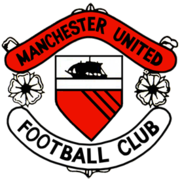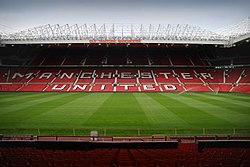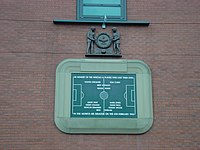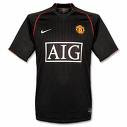-

The Manchester United team at the start of the
1905–06 season in which they were runners-up in the Second Division and promoted Chart showing the progress of
Manchester United F.C. through the
English Football League system since joining as Newton Heath in
1892–93 to
2007–08 The Manchester United team at the start of the
1905–06 season in which they were runners-up in the Second Division and promoted
The club was formed as
Newton Heath L&YR F.C. in 1878 as the
works team of the
Lancashire and Yorkshire Railway depot at
The club was formed as Newton Heath L&YR F.C. in 1878 as the works team of the Lancashire and Yorkshire Railway depot at Newton Heath. The club's shirts were green and gold halves. They played on a small, dilapidated field on North Road for fifteen years, before moving to Bank Street in the nearby town of Clayton in 1893. The club had entered The Football League the previous year and began to sever its links with the rail depot, becoming an independent company, appointing a club secretary and dropping the "L&YR" from their name to become simply Newton Heath F.C.. Not long afterwards, in 1902, the club neared bankruptcy, with debts of over £2,500. At one point, their Bank Street ground was even closed by the bailiffs.[15]
Just before having to be shut down for good, the club received a sizeable investment from J. H. Davies, the managing director of Manchester Breweries.[16] Legend goes that Harry Stafford, the club captain, was showing off his prized St. Bernard dog at a club fund-raiser, when Davies approached him to buy the dog. Stafford declined, but was able to persuade Davies to invest in the club and become club chairman.[17] It was decided at one of the early board meetings that the club required a change of name to reflect the fresh start they had been afforded. Manchester Central and Manchester Celtic were among the names suggested, before Louis Rocca, a young immigrant from Italy, said "Gentlemen, why don't we call ourselves Manchester United?"[18] The name stuck, and Manchester United officially came into existence on 26 April 1902. Davies also decided it would be appropriate to change the club's colours, abandoning the green and gold halves of Newton Heath, and picking red and white to be the colours of Manchester United.
Ernest Mangnall was appointed as club secretary after James West had resigned as manager on 28 September 1902. Mangnall was charged with trying to get the club into the First Division, and fell just short of that target at the first attempt, finishing in fifth in Division Two. Mangnall decided that it was necessary to bring in some fresh faces to the club, and signed players such as Harry Moger in goal, Dick Duckworth at half-back and John Picken up front, but it was another new half-back by the name of Charlie Roberts who made the biggest impact. He cost the club a then-record £750 from Grimsby Town in April 1904, and helped them to a third place finish in the 1903–04 season, just a point short of the second promotion place.
It was not long, however, before the club was at last promoted to the First Division for the first time under their new name, finishing in second place in the 1905–06 Second Division. A season of consolidation followed, with the club finishing in eighth, before they finally won their first league title in 1908. Manchester City had recently been under investigation for paying some of their players a salary over the amount allowed by FA regulations. They were fined £250 and eighteen of their players were banned from playing for them ever again. United were quick to pounce on the situation, picking up Billy Meredith (the Welsh Wizard) and Sandy Turnbull, amongst others. The new boys from across town were ineligible to play until New Year's Day 1907, due to their suspension, so it was left until the 1907–08 season for them to make a proper impact on United's bid for the title. And that they did, getting the campaign off to a storming start, with a 2–1 victory over Sheffield United, beginning a run of ten consecutive victories. Despite a shaky end to the season, United managed to hang on and finished the season nine points ahead of their closest rivals, Aston Villa.
The following season began with United picking up another piece of silverware, the first ever Charity Shield,[19] and ended with another, the club's first FA Cup title, sowing the seeds for what has become a record number of FA Cup titles. Just as they were in the club's first title-winning campaign, Turnbull and Meredith were instrumental in this season, Turnbull scoring the winner in the FA Cup Final. The club had to wait another two years before winning any more silverware, winning the First Division for the second time in the 1910–11 season. In the meantime, United moved to their new ground at Old Trafford. They played their first game there on 19 February 1910 against Liverpool, but lost 4–3 having thrown away a 3–0 lead. They then went trophyless again in the 1911–12 season, which not only proved to be the last with Mangnall in charge (he moved to Manchester City after ten years with United), but also the last time the club won the First Division for 41 years, the longest they have gone without winning the league in their history.
For the next ten years, the club went into a state of gradual decline before being relegated back down to Division Two in 1922. They were promoted again in 1925, but struggled to get into the top half of the table, and were relegated again in 1931. In the eight years leading up to the Second World War, the club became somewhat of a yo-yo club, reaching their all-time lowest position of 20th in Division Two in 1934. They were promoted and relegated once again before being promoted in the penultimate season before the Second World War. They guaranteed their place in the top flight for after the war by finishing in 14th in the 1938–39 season.
The Busby years (1945–1969)
-
1945 saw the appointment of Matt Busby to the manager's post at Old Trafford. He took an uncommon approach to his job, insisting that he be allowed to pick his own team, choose which players to sign and direct the team's training sessions himself. He had already missed out on the manager's job at his former club, Liverpool, because the club saw those tasks as jobs for the directors, but United decided to take a chance on Busby's innovative ideas. Busby's first signing was not a player, but a new assistant manager by the name of Jimmy Murphy. The risk the club had taken in appointing Busby paid immediate dividends, with the club finishing second in the league in 1947, 1948 and 1949 and winning the FA Cup in 1948, thanks in part to the locally born trio of Stan Pearson, Jack Rowley and Charlie Mitten (Rowley and Pearson both scored in the 1948 Cup Final), as well as the centre-half from the North-East, Allenby Chilton.
Charlie Mitten had fled to Colombia in search of a better salary, but the remainder of United's old heads managed to win the First Division title back in 1952. Busby knew, however, that football teams required more than just experience in the side, and so he adopted a policy of bringing in players from the youth team whenever possible. At first, the young players such as Roger Byrne, Bill Foulkes, Mark Jones and Dennis Viollet, took time to bed themselves into the side, sliding to a low of eighth place in 1953, but the team won the league again in 1956 with an average age of only 22, scoring 103 goals in the process. The youth policy set in motion by Busby has now become a hallmark of the most successful periods in the club's history (the mid-1950s, mid-to-late-1960s and 1990s). Busby's original "crop" of youth players was referred to as the Busby Babes, the jewel in the crown of which was a wing-half named Duncan Edwards. The boy from Dudley in the West Midlands made his United début at the age of just 16 back in 1953. It was said that Edwards could play at any position on the field, and many who saw him play said that he was the greatest player ever. The following season, 1956–57, they won the league again and reached the FA Cup final, losing to Aston Villa. They also became the first English team to compete in the European Cup, at the behest of the FA, who had denied Chelsea the same opportunity the previous season, and reached the semi-final, only to be knocked out by Real Madrid. En route to the semi-final, United also recorded a win that still stands as their biggest win in all competitions, beating Belgian champions Anderlecht 10–0 at Maine Road.
Tragedy struck the following season, when the plane carrying the team home from a European Cup match crashed on take-off at a refuelling stop in Munich, Germany. The Munich air disaster of 6 February 1958 claimed the lives of eight players – Geoff Bent, Roger Byrne, Eddie Colman, Duncan Edwards, Mark Jones, David Pegg, Tommy Taylor and Liam "Billy" Whelan – and another fifteen passengers, including United staff members Walter Crickmer, Bert Whalley and Tom Curry.[20] There had already been two attempted take-offs before the fatal third, which was caused by a build-up of slush at the end of the runway slowing the plane down to a speed insufficient for take-off. The plane skidded off the end of the runway, through a fence and into an unoccupied house. United goalkeeper Harry Gregg managed to maintain consciousness after the crash, and through fear of the plane exploding at any second, he grabbed both Bobby Charlton – who had made his United début less than 18 months earlier – and Dennis Viollet by their waistbands and dragged them to safety. Seven United players died at the scene, while Duncan Edwards died a fortnight later in hospital. Right-winger Johnny Berry also survived the accident, but injuries sustained in the accident brought his football career to a premature end. Matt Busby was not given much hope of survival by the Munich doctors, and was even given the Last Rites at one point, but recovered miraculously and was finally let out of hospital after having spent over two months there.
There were rumours of the club folding and withdrawing from all competitions, but with Jimmy Murphy taking over as manager while Busby recovered from his injuries, the club continued playing with a makeshift side. Despite the accident, they reached the FA Cup final again, where they lost to Bolton Wanderers. At the end of the season, UEFA offered the FA the opportunity to submit both United and the eventual champions, Wolverhampton Wanderers, for the 1958–59 European Cup as a tribute to the victims, but the FA declined. United managed to push Wolves right to the wire the following season, finishing in a creditable second place; not bad for a team that had lost nine first-team players to the Munich air disaster.
Busby rebuilt the team throughout the early 1960s, signing players such as Denis Law and Pat Crerand, all the while nurturing his new generation of youngsters. Perhaps the most famous of this new batch was a young man from Belfast named George Best. Best had a natural athleticism rarely seen, but his most valuable asset was his close control of a football. His quick feet allowed him to pass through almost any gap in the opposition defence, no matter how small. The team won the FA Cup in 1963, albeit finishing in 19th place in the First Division. The FA Cup triumph seemed to reinvigorate the players, who helped the club to second place in 1964, and then went one better by winning the league in 1965 and 1967. United won the European Cup in 1968, beating Eusébio's SL Benfica 4–1 in the final, becoming the first English club to win the competition. This United team was notable for containing three European Footballers of the Year: Bobby Charlton, Denis Law and George Best. Matt Busby resigned as manager in 1969 and was replaced by the reserve team coach and former United player, Wilf McGuinness.
1969–1986
-

Manchester United badge in the 1960s and early 1970s

The coat of arms of
Manchester City Council, upon which the crest of Manchester United was based. The arms are used by the club for prestigious occasions
United struggled to replace Busby, and the team struggled under Wilf McGuinness in the 1969–70 season, finishing a disappointing eighth, and following a poor start to the 1970–71 season, McGuinness was demoted back to the position of reserve team coach. Busby was coaxed back to the club, albeit only for six months. Results got better with Busby's guidance, but he finally left the club for the last time in the summer of 1971. In the meantime, United had lost a number of high-profile players such as Nobby Stiles and Pat Crerand.
Despite approaching Celtic's European Cup-winning manager, Jock Stein, for the manager's job – Stein had agreed a verbal contract to join United, but pulled out at the last minute – Frank O'Farrell was appointed as Busby's successor. However, like McGuinness, O'Farrell only lasted less than 18 months, the only difference between the two being that O'Farrell reacted to the team's poor form by bringing in some fresh talent, most specifically Martin Buchan from Aberdeen for £125,000. Tommy Docherty became manager at the end of 1972. Docherty, or "the Doc", saved United from relegation that season but United were relegated in 1974, by which time the golden trio of Best, Law and Charlton had left the club. Denis Law had moved to Manchester City in the summer of 1973, and ended up scoring the goal that many people say relegated United, and politely refused to celebrate the goal with his team mates. Players like Lou Macari, Stewart Houston and Brian Greenhoff were brought in to replace Best, Law and Charlton, but none could live up to the stature of the three that came before.
The team won promotion at the first attempt, with a young Steve Coppell making his début towards the end of that season, having joined from Tranmere Rovers, and reached the FA Cup final in 1976, but were beaten by Southampton. They reached the final again in 1977, beating Liverpool 2–1. In spite of this success and his popularity with the supporters, Docherty was sacked soon after the final when he was found to have had an affair with the physiotherapist's wife.
Dave Sexton replaced Docherty as manager in the summer of 1977, and made the team play in a more defensive formation. This style was unpopular with supporters, who were used to the attacking football preferred by Docherty and Busby. Major signings under Sexton included Joe Jordan, Gordon McQueen, Gary Bailey and Ray Wilkins, but Sexton's defensive United failed to break out of mid-table obscurity, only once finishing in the top two, and only reached the FA Cup final once, losing to Arsenal. Because of this lack of trophies, Sexton was sacked in 1981, even though he won his last seven games in charge.
He was replaced by the flamboyant Ron Atkinson, whose extrovert attitude was reflected in the clubs he managed. He immediately broke the British record transfer fee to sign Bryan Robson from his old club, West Brom. Robson would come to be touted in the future as United's best midfield player since Duncan Edwards. Atkinson's team featured new signings such as Jesper Olsen, Paul McGrath and Gordon Strachan playing alongside former youth team players Norman Whiteside and Mark Hughes. United won the FA Cup twice in three years, in 1983 and 1985, and were overwhelming favourites to win the league in the 1985–86 season after winning their first ten league games, opening a ten-point gap over their rivals as early as October. The team's form collapsed, however, and United finished the season in fourth place. The poor form continued into the following season, and with United on the edge of the First Division's relegation zone by the beginning of November 1986, Atkinson was sacked.
From :
http://en.wikipedia.org/wiki/Manchester_United#History
 manchester - manchester united doesn't has many times relax. finished melakoni leg first round 16 big league champions oppose inter milan, upbringing children sir alex ferguson must bersiap face tottenham hotspur at finals carling cup, weekend later.
manchester - manchester united doesn't has many times relax. finished melakoni leg first round 16 big league champions oppose inter milan, upbringing children sir alex ferguson must bersiap face tottenham hotspur at finals carling cup, weekend later.



























